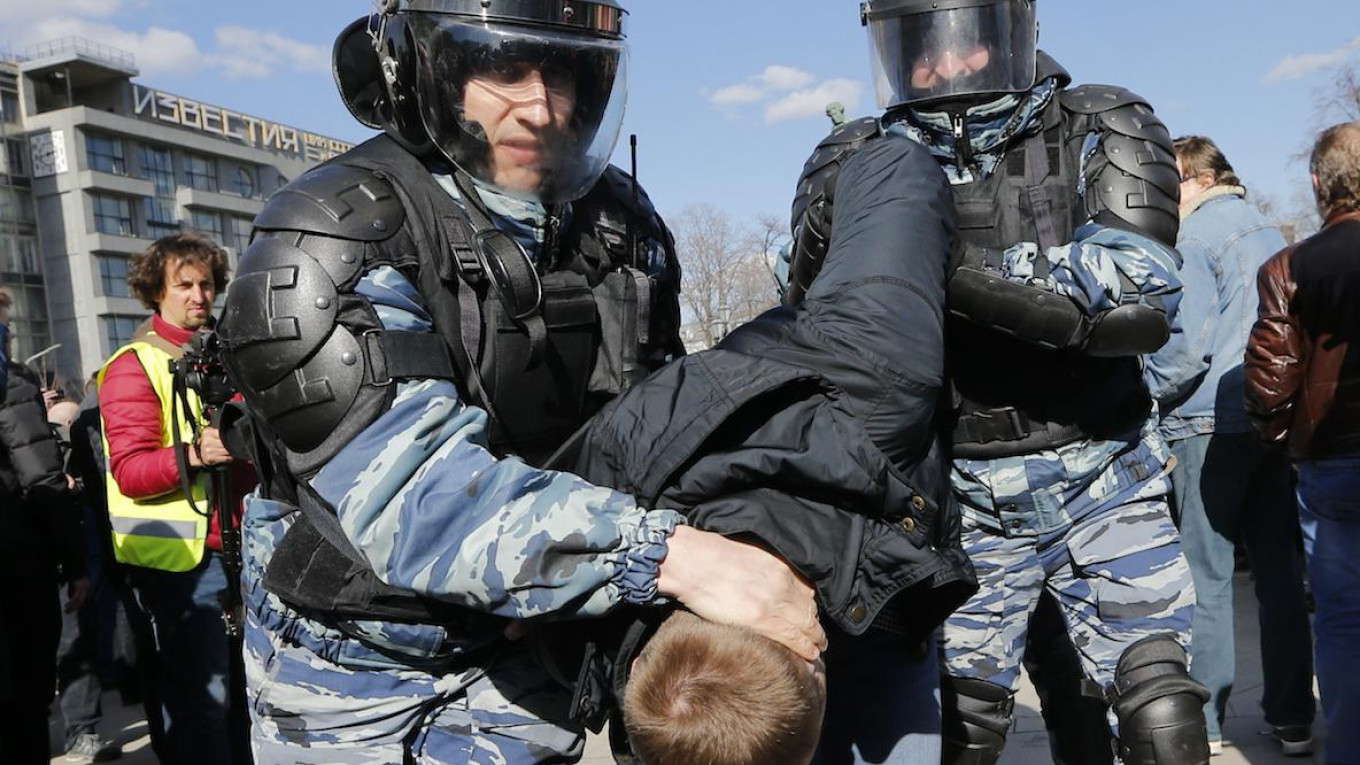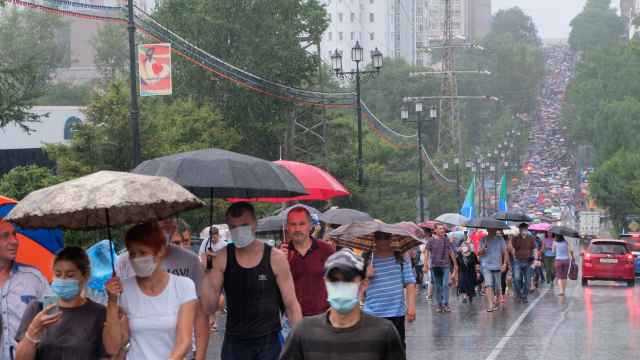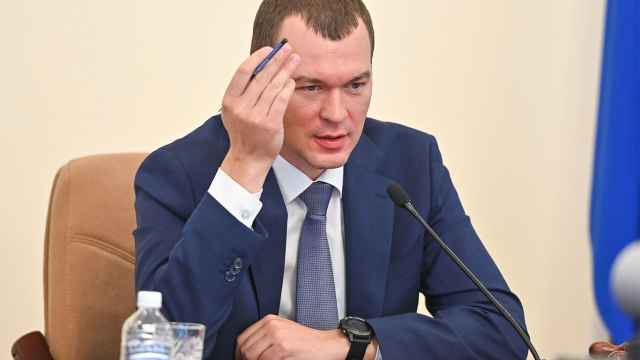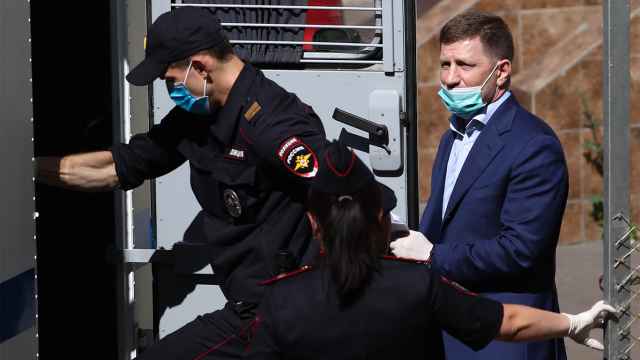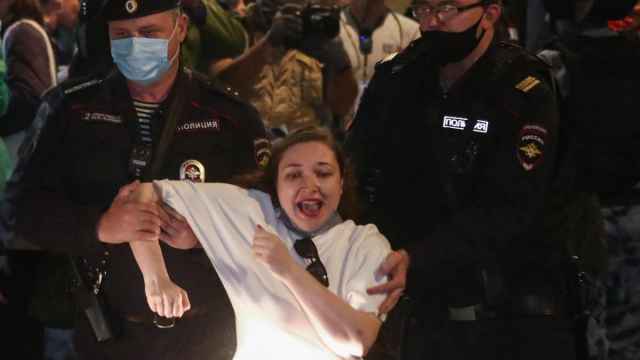If you were anywhere near central Moscow this Sunday, you likely witnessed something impressive and significant. All of downtown was on lockdown, with thousands of law enforcement officers in full riot gear. The streets and city squares were packed with people sporadically chanting and being dragged away to police vans.
Tens of thousands of people across Russia, inspired by an investigation into Prime Minister Dmitry Medvedev’s alleged corruption, were protesting across the country. In Moscow alone, a thousand people were arrested.
It was a remarkable day of civic struggle and headline news, but not if you were tuned exclusively to Russia’s state-run media.
Many noticed that Russia’s nationwide protests on Sunday — rallies that took place in urban centers, like Moscow, and in areas considered Putin’s traditional stronghold, like the Dagestani capital Makhachkala — were conspicuously absent from state television and even newswires.
This silence contrasts starkly with how the Russian media reported on even larger demonstrations in late 2011 and 2012, when protests caught the Kremlin off guard and reportedly infuriated Vladimir Putin and his inner circle, who had completely failed to anticipate and preempt the movement.
The coverage of those protests was either neutral and professional, like the work by state news agency RIA Novosti (later disbanded and integrated into the more loyalist Rossiya Segodnya), or slanted and critical of the opposition, like reports on the state-run TV channels.
Say what you will about the coverage back then, but it was there.
The same couldn't be said about Russia’s mainstream news outlets this Sunday. At the height of the Moscow protest, when police started dragging people away by the hundred, the top story on RIA’s new website read: “Freedom-Loving Cow in U.S. Escapes Cops in a Dramatic Chase.”
Even Russia’s Sunday TV shows — hosted by the nation’s most popular pundits — failed to mention the protests. There was even silence from Dmitry Kiselyov, whose flagship program, “News of the Week,” is often edited on the fly, to add new content before the show is done airing in all Russia’s 11 time zones.
In fact, Kiselyov did say on air that “corruption is rampant and people are demoralized,” but he was talking about Ukraine, which Russian television typically covers in far greater detail than any domestic matter.
Much of Russia’s Web-based media didn’t fare much better on Sunday. Later in the day, when the protests became too large to ignore, RIA Novosti’s website begrudgingly acknowledged the simple fact that mass demonstrations were underway (“Opposition Activists Arrested At Illegal Demonstration”), burying the news at the bottom of its home page (top news: “Two Russian Football Fans Beaten in Belgrade”), without once mentioning the reason for the demonstrations.
More disturbing was the behavior of Yandex-Novosti, the country’s largest national news aggregator. Yandex, a private company, has long been under pressure from Russian authorities looking for ways to suppress unwanted coverage and promote pro-Kremlin stories.
On Sunday, Yandex’s local news feed for Moscow prominently featured trivialities such as weather reports warning of a cold spell and promotions for the city’s “Spring Festival.” On the national level, protests were overshadowed by news like Ukraine’s Foreign Minister Pavlo Klimkin’s op-ed in The Guardian and Russia’s reaction to Kiev banning its Eurovision contestant.
It’s no secret that the Russian authorities are able to manipulate Yandex’s news feed, without resorting to outright censorship. The mayor’s office of Moscow, for example, is known to have registered dozens of obscure, almost identical, media outlets — all to bombard Yandex with small stories about city projects, just to keep the news (and the mayor’s agenda) trending on Yandex.Novosti.
In a press release this Monday, trying to clear its name, Yandex said it aggregates the news automatically, using algorithms, and the company vaguely accused the government of trying to manipulate its system.
Today, there are also more straightforward ways to shape Yandex.Novosti. Government ministries and other state agencies recently gained the right to register as news outlets, meaning the government can pump stories openly and directly into Yandex’s aggregator.
This quirk led to what was probably the strangest Yandex.Novosti blip on Sunday, when dozens of “media” websites with names like “Dagestan’s Ministry of Sports” started churning out breaking news with the headline “Makhachkala Refuses to Join Anti-Corruption Protests.”
Translation: And this is how Yandex is unveiling its latest feature: government offices can register as news outlets on Yandex.Novosti
This appears to have been a clumsy attempt to suppress reports about the demonstrations that did indeed take place in Dagestan’s capital on Sunday.
Ironically, these phony headlines were some of the only coverage in which Russia’s state media explicitly mentioned the reason for the demonstrations at all. Other outlets, such as the news agencies RIA and TASS, carefully tiptoed around the corruption allegations against Prime Minister Medvedev, even when quoting state officials.
The official comments that did appear in news reports were predictable: Foreign Minister Sergei Lavrov accused the West of “double standards” in policing, while State Duma speaker Vyacheslav Volodin resorted to some familiar whataboutism, pointing out that police brutality against protesters is rampant in the West.
Again, nobody in the state media would say what the demonstrations were actually about.
As Russian television’s two biggest networks, Channel One and Rossiya, continued to ignore the elephant in the room (instead airing bulletins about heavy snowfall in Moscow, trouble in Ukraine, and a fatal avalanche in Japan), Putin’s spokesman, Dmitry Peskov, said rather unconvincingly that the Kremlin doesn’t set editorial policy for Russian national television.
“They show what they consider to be important and significant," Peskov told reporters.
On Monday, Alexei Navalny, the opposition leader whose investigation into Dmitry Medvedev fueled the nationwide protests, went to trial for disturbing the peace and resisting a police officer. A judge fined him 20,000 rubles (about $350) and sentenced him to 15 days in jail.
During the hearing, Navalny confronted a state TV camera crew in the courtroom.
“Why didn’t you cover the protests yesterday?” he asked.
“We’re small people,” they responded with refreshing honesty. The answer’s meaning was clear: decisions about what to cover are above their pay grade.
A Message from The Moscow Times:
Dear readers,
We are facing unprecedented challenges. Russia's Prosecutor General's Office has designated The Moscow Times as an "undesirable" organization, criminalizing our work and putting our staff at risk of prosecution. This follows our earlier unjust labeling as a "foreign agent."
These actions are direct attempts to silence independent journalism in Russia. The authorities claim our work "discredits the decisions of the Russian leadership." We see things differently: we strive to provide accurate, unbiased reporting on Russia.
We, the journalists of The Moscow Times, refuse to be silenced. But to continue our work, we need your help.
Your support, no matter how small, makes a world of difference. If you can, please support us monthly starting from just $2. It's quick to set up, and every contribution makes a significant impact.
By supporting The Moscow Times, you're defending open, independent journalism in the face of repression. Thank you for standing with us.
Remind me later.



